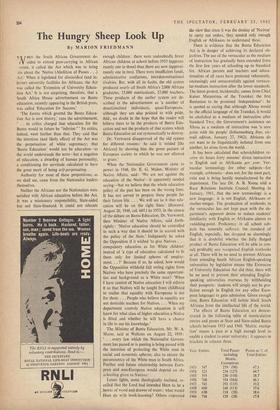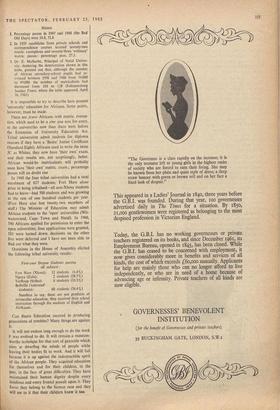The Hungry Sheep Look Up
By MARION FRIEDMANN NIL THEN the South African Government de- /V Bided to extend pass-carrying to African . omen, it called the Act which was to bring his about the `Native (Abolition of Passes . . .) Act.' When it legislated for diminished (and in- ferior) university facilities for Africans, the Act was called the 'Extension of University Educa- tion Act.' It is not surprising, therefore, that a South Africa House advertisement on Bantu education, recently appearing in the British press, was called `Education for Success.'
`The furore which greeted the Bantu Educa- tion Act is now history,' runs the advertisement, . . its critics charged that education for the Bantu would in future be "inferior."' Its critics, indeed, went further than that. They said that the intention (and likely effect) of the Act was the perpetuation of white supremacy; that `Bantu Education' would not be education—as the world understands the term—but a negation of education, a dwarfing of human personality, a conditioning for servitude calculated to have the great merit of being self-perpetuating.
Authority for most of these propositions, as we shall see, came from the Nationalist leaders themselves.
Neither the Africans nor the Nationaljsts were satisfied with African education before the Act. It was a missionary responsibility, State-aided but not State-financed. It could not educate enough children: there were undoubtedly fewer African children at school before 1953 (approxi- mately one in three) than there are now (approxi- mately one in two). There were insufficient funds, administrative confusions, interdenominational rivalries. But, with all its faults, the old system produced nearly all South Africa's 2,000 African graduates, 15,000 matriculants, 27,000 teachers. These products of the earlier system are de- scribed in the advertisement as 'a number of denationalised individuals, quasi-Europeans,' although they are also pointed to with pride, ibid., no doubt in the hope that the reader will believe them to be the products of Bantu Edu- cation and not the products of that system which Bantu Education set out systematically to destroy.
Dr. Verwoerd disapproved of the old system for different reasons: he said it 'misled [the African] by showing him the green pasture of European society in which he was not allowed to graze.'
When the Nationalist Government came to power in 1948, Dr. E. G. Malan, Minister of Native Affairs, said : 'We are not against the education of the Native'—it apparently needed saying—'but we believe that the whole education policy of the past has been on the wrong lines. It has not served to prepare these people for their 'future life. . . . We will see to it that edu- cation will be on the right lines.' (Hansard, August 20, 1948, col. 605.) In 1953, in the course of the debate on Bantu Education, Dr. Verwoerd, then Minister of Native Affairs, said forth- rightly : 'Native education should be controlled in such a way that it should be in accord with the policy of the State.' Indignantly he asked the Opposition if it wished `to give Natives . . . compulsory education as for White children' instead of 'a type of education calculated to fit them only for limited spheres of employ- ment. . . ?' Because if so, he asked, how would the Opposition withhold full voting rights from Natives who have precisely the same opportuni- ties and background as a White man? 'When I have control of Native education I will reform It so that Natives will be taught from childhood to realise that equality with Europeans is not for them. . . . People who believe in equality are not desirable teachers for Natives. .. . When my department controls Native education it will know for what class of higher education a Native is fitted and whether he will have a chance in life to use his knowledge.'
The Minister of Bantu Education, Mr. W. A. Maree, said at Welkom on August 22, 1959: . . every law which the Nationalist Govern- ment has passed or is passing is being passed with the intention of protecting the White man in social and economic spheres; also to ensure the paramountcy of the White man in South Africa. Further and future relationship between Euro- pean and non-European would depend on the schooling given to Natives.'
Lesser lights, some theologically inclined, re- called that the Lord had intended Ham to be a hewer of wood and drawer of water: what would Ham do with book-learning? Others expressed the view that since it was the destiny of 'Natives' to carry out orders, they needed only enough English or Afrikaans to understand these.
There is evidence that the Bantu Education Act is in danger of achieving its declared ob- jectives. The use of the vernacular as the medium of instruction has gradually been extended from the first few years of schooling up to Standard Six. African parents and teachers and educa- tionalists of all races have protested vehemently, unceasingly and unsuccessfully against vernacu- lar-medium instruction after the lower standards. The latest protest, incidentally, comes from Chief Kaiser Matanzima of the Transkei, the first Bantustan to be promised 'independence': he is quoted as saying that although Xhosa would be the official language of the Transkei, it would be abolished as a medium of instruction after Standard Two; the Government's insistence on Xhosa as a medium of instruction was 'a sore point with the people' (Johannesburg Star, air- mail edition, January 27, 1962). Africans do not want to be linguistically isolated from one another, let alone from the world.
It has been calculated that schoolchildren re- ceive six hours forty minutes' direct instruction in English and in Afrikaans per year. Ver- nacular terminology for other subjects—for example, arithmetic—does not, for the most part, exist and is being hastily manufactured by the department. The late Dr. A. B. Xuma told a Race Relations Institute Council Meeting in January, 1961, that the new terminology is a new language : it is not English, Afrikaans or mother-tongue. The production of textbooks in the vernacular has not kept pace with the de- partment's apparent desire to reduce students' familiarity with English. or Afrikaans almost to vanishing-point. Proficiency in all school sub- jects has naturally suffered; the standard of English, especially, has dropped so alarmingly that it is doubtful whether the fully fledged product of Bantu Education will be able to con- sult profitably any recognised English textbooks at all. There will be no need to prevent Africans from attending South African English-speaking universities by legislative means (the Extension of University Education Act did this); there will be no need to prevent their attending English- speaking universities overseas by withholding their passports : students will simply not be pro- ficient enough in English (or any other Euro- pean language) to gain admission. Given enough time, Bantu Education will isolate black South Africans from the intellectual life of the world.
The effects of Bantu Education are demon- strated in the following table of matriculation entries and passes at State and State-aided Bantu schools between 1953 and 1960. `Matric. exemp- tion' means a pass at a high enough level to enable a student to enter university : it appears in brackets in column three.
Year Entries Total Passes Passes as % of including Total Entries Matric.
Exemptions 1953 547 259 (90) 47.3 1954 523 234 (127) 44.7 1955 595 230 (110) 38.7 1956 768 354 (164) 46.1 1957 745 292 (135) 39.2 1958 660 248 (113) 37.6 1959 630 118 (38) 18.6
1960 716 128 (28) 17.9
NOTES
I. Percentage passes in 1947 and 1948 (the Bad Old Days) were 54.8, 52.8.
2. In 1959 candidates from private schools and correspondence courses secured seventy-two matric. exemptions and seventy-three 'ordinary' matric. passes: percentage pass, 27.3.
3. Dr. E. Malherbe, Principal of Natal Univer- sity. deploring the deterioration shown in this table, pointed out that, although the number of African secondary-school pupils had in- creased between 1956 and 1960 from 34.000 to 49,000, the number of matriculants had decreased from 354 to 128 (Johannesburg .Sunday Times. where the table appeared. April 16. 1961).
It is impossible to try to describe here present 'university' education for Africans. Some points, however, must be made.
There are fewer Africans with matric. exemp- tion, which used to be a sine qua non, for entry, at the universities now than there were before the Extension of University Education Act. Tribal universities admit students for diploma courses if they have a 'Bantu' Junior Certificate (Standard Eight). Africans used to write the same JC as Whites; they now have 'their own' exam. and their results are, not surprisingly, better. African would-be matriculants will probably soon have 'their own' matric. exam.; percentage passes will no doubt rise In 1960 the four tribal universities had a total enrolment of 637 students; Fort Hare alone prior to being tribalised—all non-Xhosa students had to leave—had 500 students and was growing at the rate of one hundred students per year. (Fort Hare also lost twenty-two members of staff.) The Minister of Education may admit African students to the 'open' universities (Wit- watersrand, Cape Town and Natal). In 1960, 190 Africans applied for permission to enter the open universities; four applications were granted, 181 were turned down, decisions on the other five were deferred and I have not been able to find out what they were.
Questions in the House of Assembly elicited the following tribal university results:
First-year Degree Students passing all subjects : Fort Hare (Xhosa): 12 students (1.4%) Ngoya (Zulu): 2 students (28.5%) Turfloop (Sotho): 6 students (33.3%) Bellville ('coloured' students): 60 students (56.4%) Needless to say, these are not products of vernacular education; they received their school instruction through the medium of English and Afrikaans.
Can Bantu Education succeed in producing generations of zombies? Many things are against it.
It will not endure long enough to do the work 1' was evolved to do. It will remain,a museum- worthy technique for that sort of genocide which aims at dwarfing the minds of people while leaving their bodies fit to work. And it will fail because it is up against the indestructible spirit of the African people. They acquired education for themselves and for their children, in the past, in the face of great difficulties. They have maintained their human dignity despite every insidious and every frontal assault upon it. They know they belong to the human race and they will see to it that their children know it too.



































 Previous page
Previous page